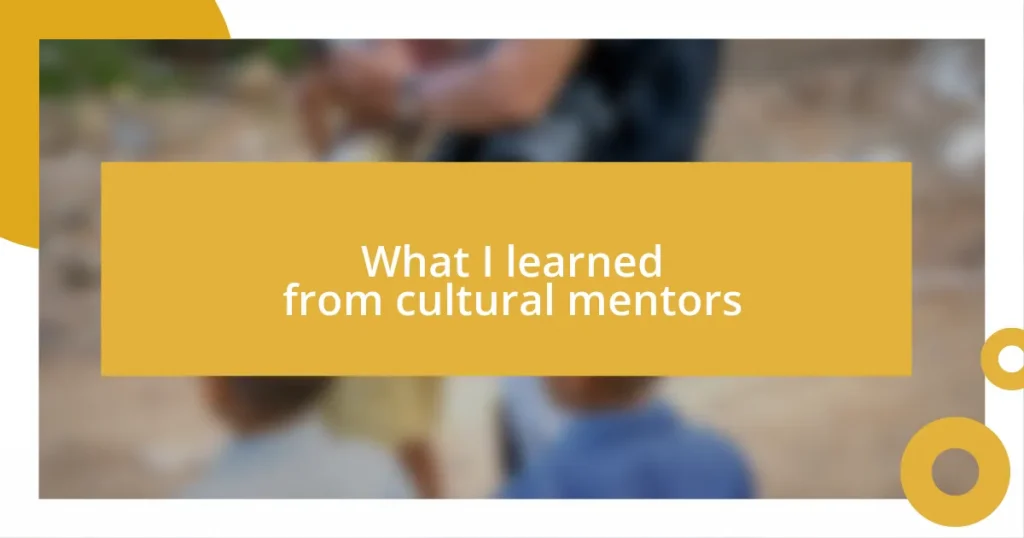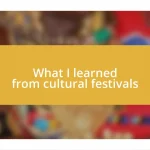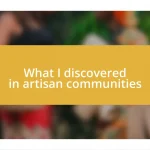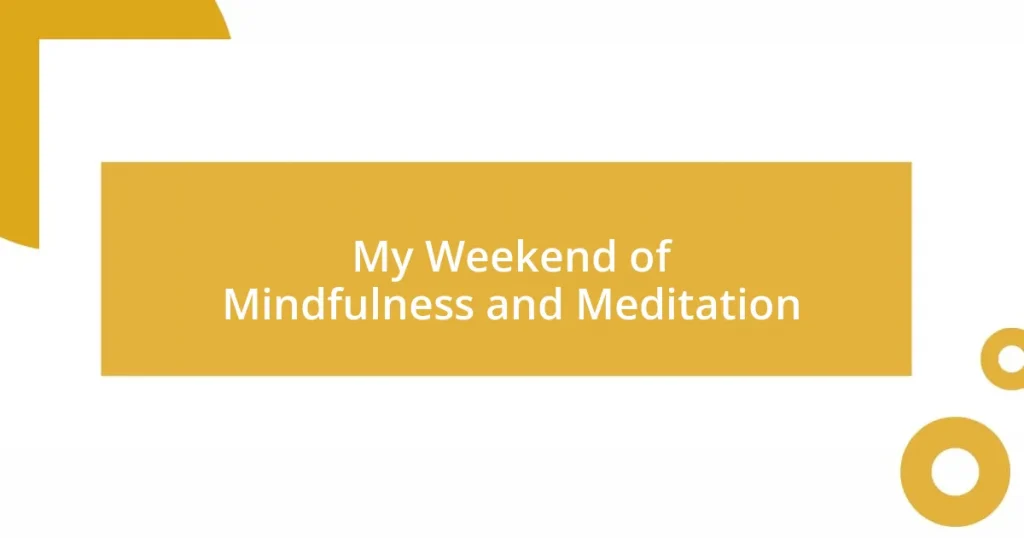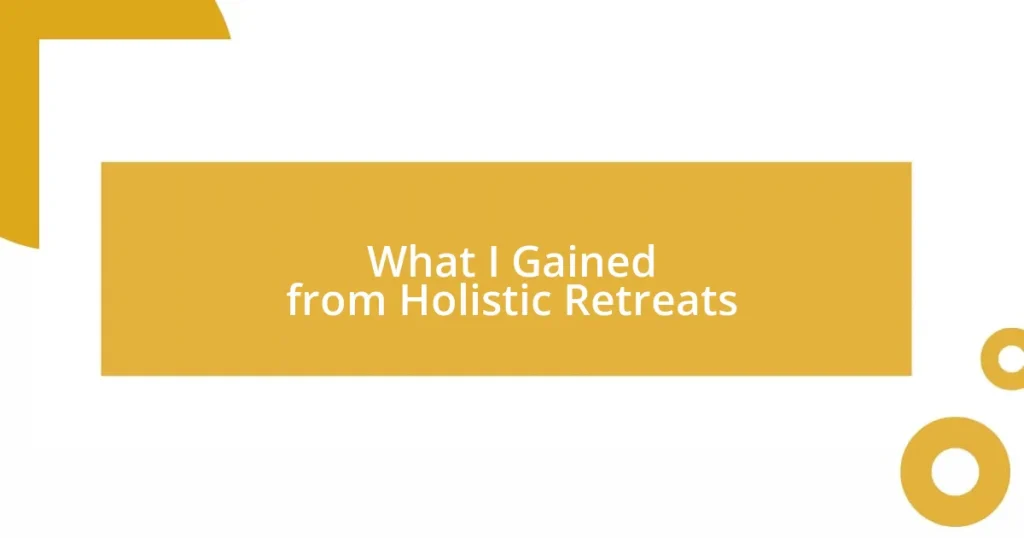Key takeaways:
- Cultural mentorship fosters a sense of belonging and empathy by bridging diverse experiences and shared struggles.
- Identifying potential cultural mentors involves seeking individuals engaged in cultural activities, who are approachable and willing to share their experiences.
- Effective communication with mentors requires active listening, adaptability, and a willingness to explore different cultural perspectives.
- Applying lessons from mentors, such as patience and curiosity, can lead to personal and professional growth, emphasizing the importance of giving back through shared insights.
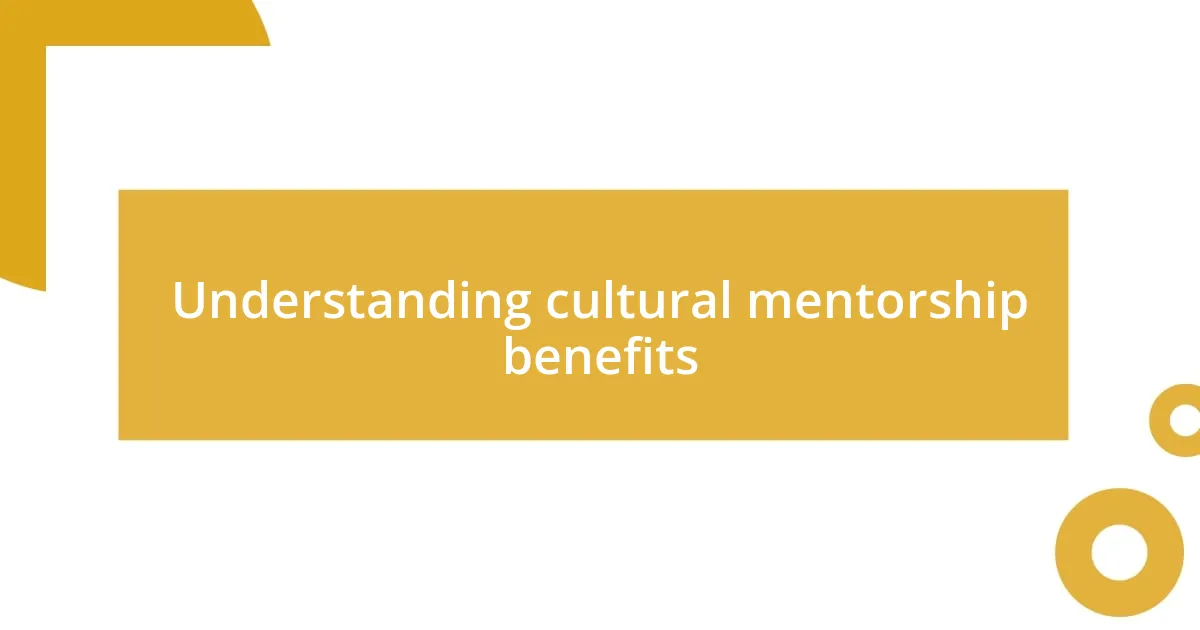
Understanding cultural mentorship benefits
Cultural mentorship offers unique benefits that extend far beyond knowledge transfer. I remember my first mentor, a brilliant woman from a completely different background than mine, who introduced me to customs and practices that were foreign yet fascinating. Her stories didn’t just teach me about her culture; they bridged gaps between our experiences and helped me develop a deeper empathy for diverse perspectives.
When I think about the emotional impact of cultural mentorship, I realize how vital it is in fostering a sense of belonging. There was a moment when my mentor shared her own struggles with feeling out of place, and I felt a wave of relief wash over me. It’s incredible how these shared experiences can turn differences into common ground, isn’t it?
Additionally, engaging with cultural mentors encourages a more expansive worldview. I found myself considering questions I had never pondered before, like how cultural contexts shape our identities. This dialogue not only enriched my personal growth but also influenced my professional interactions, reminding me that understanding is a powerful tool in our increasingly globalized society.
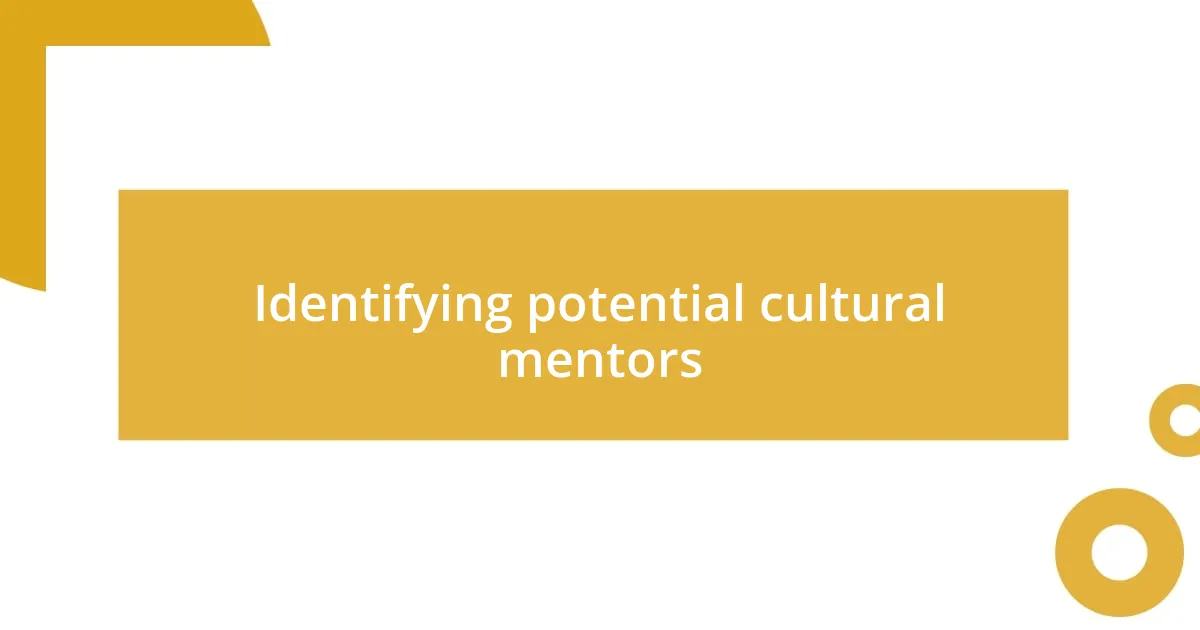
Identifying potential cultural mentors
Identifying potential cultural mentors starts with observing the people around you, particularly those who represent diverse backgrounds. I often look for individuals who actively participate in cultural dialogues or community events. Reflecting on my journey, I remember how a simple conversation at a local festival led me to someone whose life experiences were rich with wisdom, and our discussions opened my eyes to aspects of culture I had never considered.
Here are some characteristics to help identify potential cultural mentors:
– Engagement in Cultural Activities: Look for those who actively participate in festivals, workshops, or community events related to their culture.
– Openness to Share: Identifying individuals willing to share their experiences can lead to meaningful exchanges.
– Diverse Life Experiences: Individuals with varied cultural backgrounds often possess insights that can vastly enrich your perspective.
– Approachability: Seek out mentors who are not only knowledgeable but also approachable, as this fosters a comfortable space for dialogue.
– Empathy and Understanding: Look for mentors who express empathy, as they can help you navigate cultural nuances with sensitivity.
Finding cultural mentors can be a transformative journey, and I’ve always been surprised at how a simple ongoing connection can blossom into a profound mentorship. The excitement of discovering new perspectives makes the process all the more rewarding!
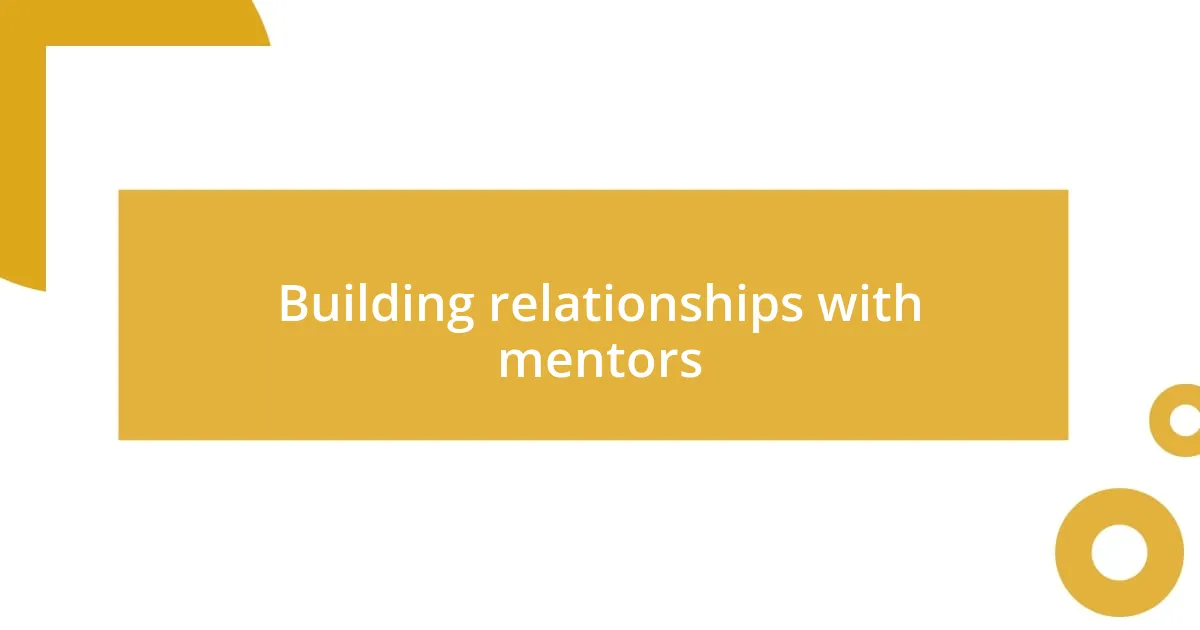
Building relationships with mentors
Building relationships with mentors can be one of the most rewarding experiences in our personal and professional journeys. I vividly recall the day I reached out to my mentor—someone I had admired from afar. The conversation was a blend of excitement and nervousness for both of us. As I shared my aspirations and fears, I could sense the genuine interest in her responses. It was this initial connection that laid the groundwork for our ongoing relationship, making it a safe space for both mentorship and growth.
Over time, trust became the bedrock of our relationship. I learned that it takes patience and effort to cultivate that trust. For instance, I started sharing small victories and setbacks in my professional life, which not only deepened our conversations but helped her understand my journey better. I really felt she invested in my growth, which made our dynamic feel more like a partnership than a traditional mentor-mentee connection. Wouldn’t it be great if everyone experienced that level of understanding?
Additionally, I realized that building relationships with mentors involves being proactive in the dialogue. I would often prepare questions tailored to her expertise, transforming our meetings into discovery sessions. This collaborative approach reminded me that mentorship is a two-way street. Her insights were invaluable, yet the discussions also allowed her to reflect on her experiences, which brought us even closer. The energy was palpable, making our mentorship feel like a shared adventure.
| Characteristics | Impact on Relationship |
|---|---|
| Active Engagement | Builds trust and fosters openness. |
| Empathy | Creates a safe space for sharing challenges. |
| Proactive Dialogue | Encourages mutual learning and collaboration. |
| Genuine Interest | Strengthens the emotional bond between mentor and mentee. |
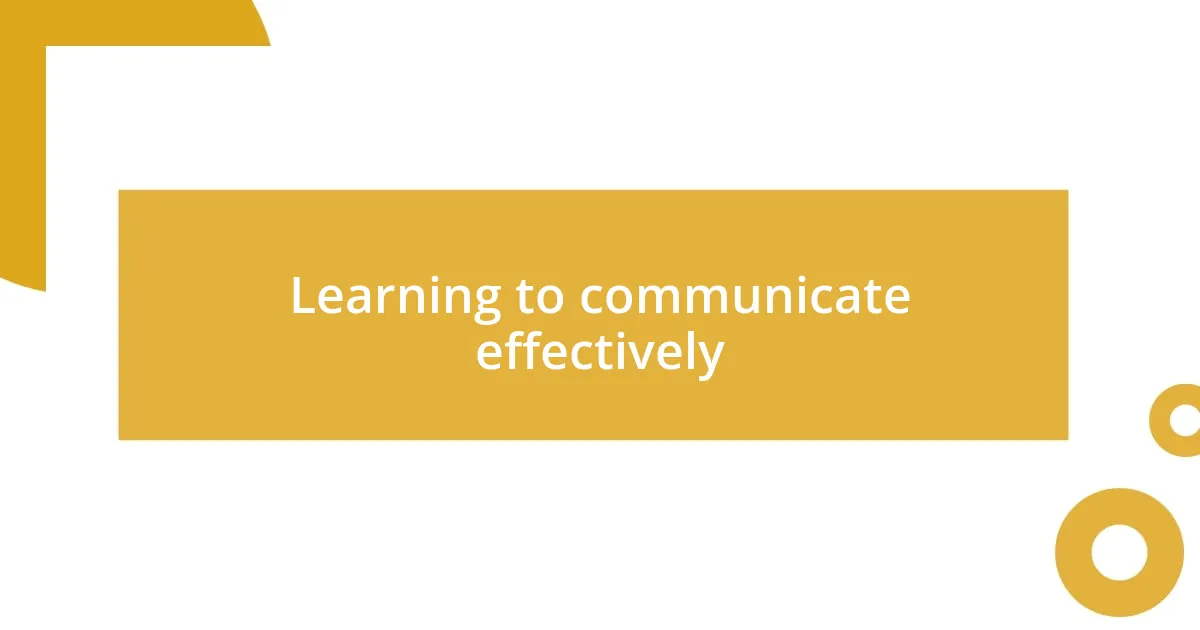
Learning to communicate effectively
Effective communication isn’t just about exchanging words; it’s about understanding the emotions and cultures behind them. I can still recall a moment when I misinterpreted a mentor’s feedback. Instead of feeling defeated, I started to ask clarifying questions. Through that process, I learned to value not just what was said, but how it was said. Isn’t it fascinating how a simple shift in our approach can deepen our understanding?
Furthermore, I discovered the importance of adapting my communication style. My mentor often used metaphors grounded in her cultural experiences. At first, I felt a little lost, but as I engaged more deeply, those metaphors helped me visualize complex ideas. Has there been a time when a unique expression changed your perspective? That experience taught me that effective communication thrives on being adaptable and open to new interpretations.
Engaging in active listening was perhaps the most valuable lesson I learned from my mentors. I remember a poignant discussion where I paused to truly absorb what was being shared. That moment of silence led to deeper revelations and insights from my mentor, revealing layers of meaning I hadn’t considered before. Don’t you think taking a pause can sometimes speak louder than words? Emphasizing this practice has transformed my interactions, making them richer and more profound.
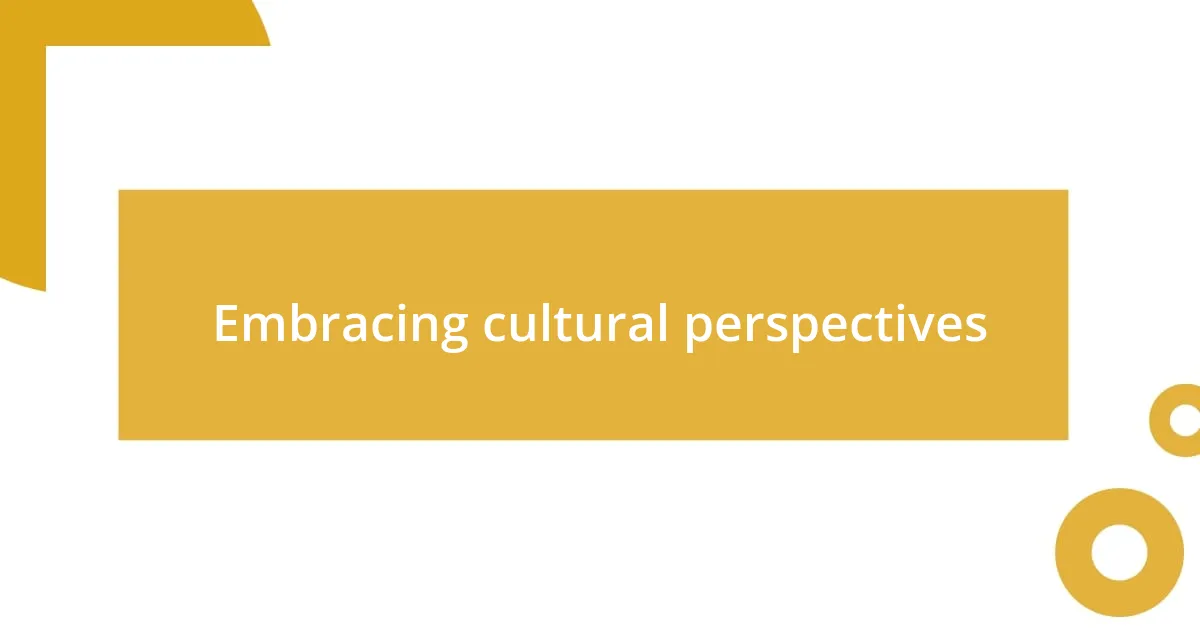
Embracing cultural perspectives
Embracing cultural perspectives has been one of the most enlightening aspects of my journey with mentors. I remember a time when a mentor introduced me to a traditional story from her culture. As she shared the tale, I found myself completely captivated—not just by the narrative itself, but by how it reflected her values and beliefs. Have you ever felt a connection to someone simply through a story? It made me realize how powerful sharing cultural backgrounds can be in fostering understanding.
In subsequent conversations, I made a conscious effort to explore different cultural lenses, asking my mentors about their experiences and how they shaped their viewpoints. One mentor shared her struggles with balancing her personal identity against societal expectations. It was a raw moment; I felt empathy wash over me, understanding that our life experiences, though different, often resonate on similar emotional frequencies. Isn’t it incredible how our cultural differences can bring us closer rather than pull us apart? Embracing these perspectives can truly enrich our relationships.
Another moment that stands out involved a discussion about conflict resolution—a topic where cultural differences shine. My mentor explained that, in her culture, maintaining harmony often took precedence over direct confrontation. Listening to her, I reflected on my own approach, which sometimes favored openness and honesty at the cost of peace. This realization was eye-opening! How often do we default to our own cultural norms without considering others’? Embracing diverse cultural perspectives not only broadens our understanding but also equips us with tools to navigate conflicts more thoughtfully.
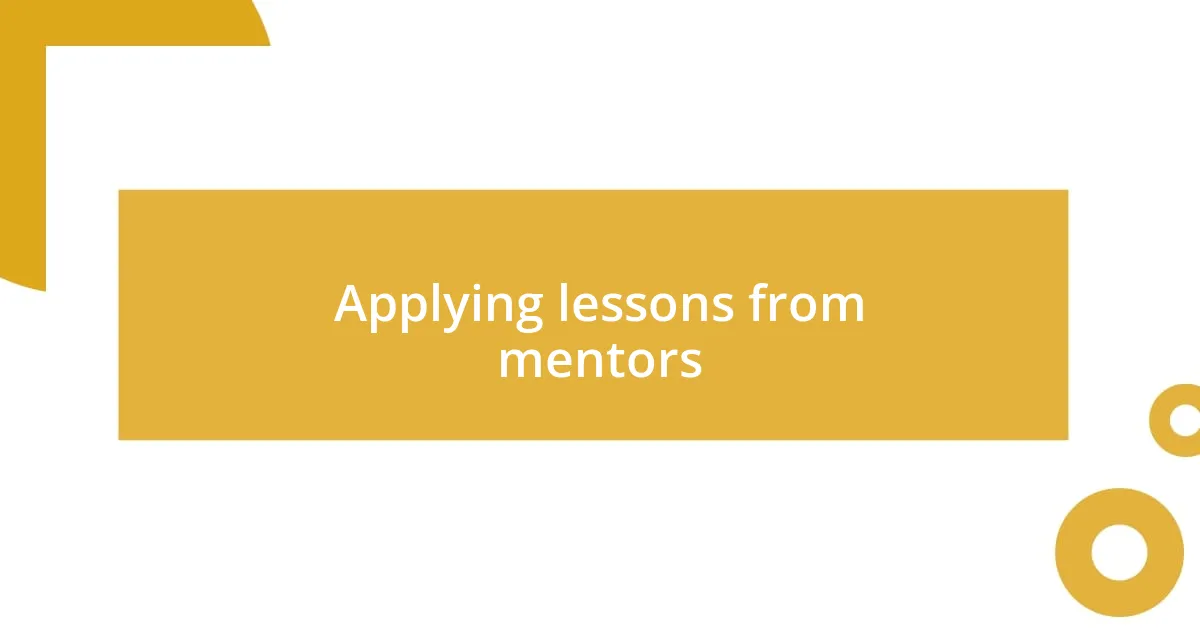
Applying lessons from mentors
Applying the lessons from my mentors has been transformative in both my personal and professional life. I recall a time when one of my mentors emphasized the value of patience. There was a project that wasn’t going as planned, and I felt the pressure to hurry things along. Instead of rushing, I decided to take a step back and observe. It was incredible how that small shift allowed me to see the bigger picture and ultimately led to a more successful outcome. Have you experienced a moment when slowing down actually accelerated your progress?
I’ve also learned to approach challenges with curiosity rather than fear, a lesson that came directly from a mentor who faced adversity with grace. During a particularly rough patch in my career, instead of succumbing to stress, I remembered her advice: “What if this challenge is an opportunity disguised as a problem?” With that mindset, I began to explore alternative solutions, turning obstacles into stepping stones. Isn’t it amazing how our perspectives can shift simply by reframing our thoughts?
Furthermore, my mentors have taught me the importance of giving back by sharing these lessons with others. In a recent community workshop, I guided a group in discussing their unique experiences and cultural insights. The true reward came when participants shared how the conversation sparked their understanding of one another. I realized that mentorship is a cycle of learning and sharing. How does sharing what we’ve learned impact those around us? For me, it not only deepens connections but also fosters a sense of belonging among diverse individuals.
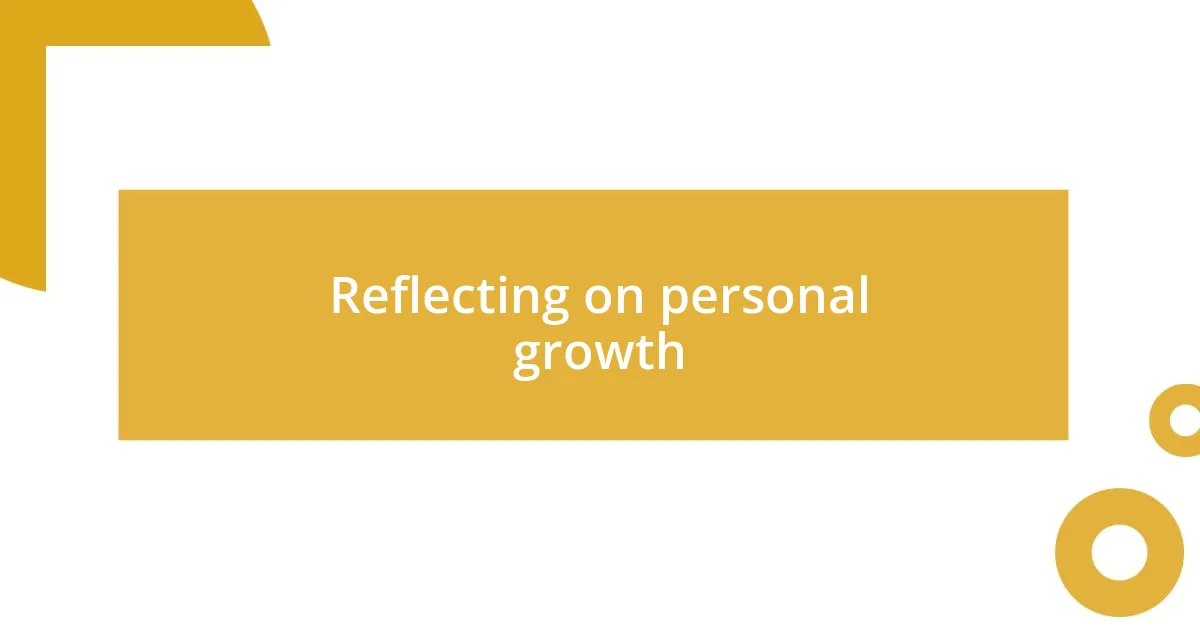
Reflecting on personal growth
Reflecting on my personal growth through the lens of my cultural mentors has brought a sense of clarity and purpose to my life. I think back to a time when I sat with a mentor who shared tales of her grandmother’s struggles during migration. Her emotional recounting struck a chord with me, making me analyze my own background and the privileges I’ve often taken for granted. Have you ever found yourself redefining your identity by connecting with someone else’s past? That moment taught me that understanding different paths can illuminate our own.
As I navigated through my personal development, I noticed how these reflections often shattered my preconceived notions. I distinctly remember a dinner with a mentor where we delved into the intricacies of cultural identity. Her passion for preserving her heritage made me reflect on how I honor my own culture. I realized that personal growth stems not just from achievement, but from the vulnerability of sharing and embracing our roots. It made me wonder—how can our stories and the stories of others intertwine to foster deeper connections?
Every lesson from my mentors became a stepping stone towards a better version of myself. I can’t forget one particular mentoring session when a mentor encouraged me to confront my biases. It was uncomfortable, to say the least. But as I reflected on those moments, I felt a shift within me—a deeper understanding and empathy for viewpoints that differed from my own. Isn’t it fascinating how personal growth can sometimes emerge from examining the shadows of our own beliefs? That’s when I realized this journey isn’t just about learning; it’s about transforming into a more compassionate individual.










